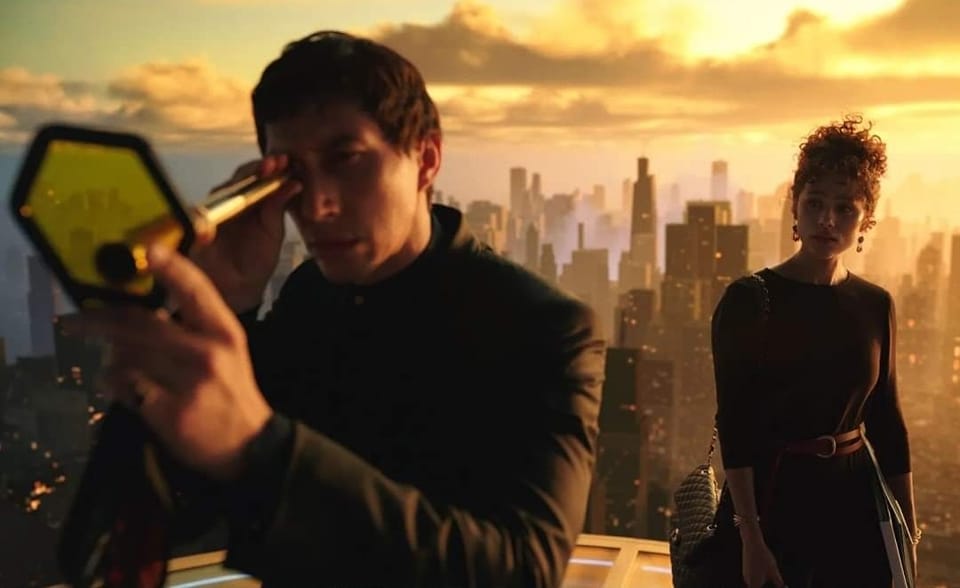
The epic Megalopolis is Francis Ford Coppola’s labor of love, a project he had been imagining since the 1970s. I’m glad he finally got to make the movie he wanted to make. Sadly, it’s not good.
Megalopolis is set later in this century in a New York City fictionalized as New Rome. Cesar Catilina (Adam Driver), a visionary urban designer, seeks to replace midtown Manhattan with his creation, a utopian built environment. From his aerie atop the Chrysler Building, Cesar is as unaccountable Robert Moses in The Power Broker. Cesar must overcome the resistance of the vision-impervious mayor Cicero (Giancarlo Esposito), the psychotically venal aristocrat Clodio (Shia LaBeouf) and Cesar’s own ruthlessly avaricious mistress Wow Platinum (Aubrey Plaza). Mayor Cicero’s Wild Child daughter Julia (Nathalie Emmanuel) sets out to punish Cesar for Cesar’s disrespect to her father, but she becomes fascinated by him.
Obviously, no one can imagine razing and rebuilding 100 contiguous square blocks of Manhattan without some hubris, and Cesar has plenty. Of course, he has invented a miracle building material, won a Nobel Prize and has the super power of stopping time. But his hubris makes him underestimate his enemies at his peril. Soon, Cesar and New Rome are plunged into a convulsion of betrayal and treachery. Will Cesar and his vision survive?
The visuals are astounding. New Rome is so dystopian that we yearn for the Times Square of Joe Buck, Ratso Rizzo and Travis Bickle. Ben Hur-like gladiator battles emerge, and a circus looks like Baz Luhrman’s Moulin Rouge. There’s no shortage of eye candy.
Unfortunately, there are also no shortage of movie-killing flaws. The first is the revolting pretentiousness. Each chapter is introduced with a self-important title, carved into stone, no less. Great Thinkers, from Marcus Aurelius to Ralph Waldo Emerson, are quoted, and, just in case that isn’t elevated enough, Latin is occasionally uttered. Every time poor Lawrence Fishburne speaks in voice-over, he’s proclaiming something ridiculously heavy-handed without any irony. All of these Great Thoughts are about as deep as the inside of a Hallmark greeting card.
The second major flaw is that Megalopolis is a message movie with a message that is naive and simplistic. Coppola seems to have missed the core lesson in The Power Broker, which is that the tradeoff for letting an unaccountable visionary build great things in a city, is that the result may be unjust, and that regular people are stripped of any ability to control their own lives. Everybody likes freedom, which requires the messiness and inefficiency of democracy. Coppola wants us to root for Cesar because he is vaguely high-minded, but letting Cesar have his way on everything is pretty disrespectful of Cesar’s fellow citizens.
Third, with one exception, the characters are cartoonish, like they’ve been pulled from a Batman movie. As a result, we don’t care about them. For example, there’s never been an actress better equipped to play a dangerous, sexy conniver than Aubrey Plaza; but here, Plaza only gets to act like a comic strip version of a dangerous, sexy conniver. Clodio is a silly cross between a Bond villain and Dr. Frank-N-Furter from The Rocky Horror Picture Show (and Shia LaBeouf ‘s eye makeup sometimes makes him resemble TV character actor Anthony Zerbe). Cesar himself toggles between smug and tortured with little texture.
Finally, the story is often incomprehensible.
This all makes for a wretched movie-viewing experience.
There are a few bright spots. Nathalie Emmanuel seems to be acting in a different movie than the rest of the cast, and imbues her Julia with life force, charisma and genuine feelings. Ratso Rizzo and Joe Buck themselves are back in very small parts. Dustin Hoffman sparkles as a big city fixer. Jon Voight plays a doddering financier with the dulled eyes and speaking mannerism of Donald Trump – very funny. And what about the name of Aubrey Plaza’s character – Wow Platinum? What would her stripper name be?
It pains me to pan a Coppola movie. Casablanca remains my favorite all-time movie, but The Godfather Part II is probably my #2. Godfather II, along with The Godfather, The Conversation and Apocalypse Now! are films that have impacted me deeply. That being said, as fond of Coppola as I am, and even reverential, I haven’t been enraptured by his post-1979 body of work.
In the first 20 minutes of Megalopolis, I resolved that I didn’t care about any aspect of the film and was going to walk out, but somehow stayed for the entire two hours, eighteen minutes, You don’t need to.


